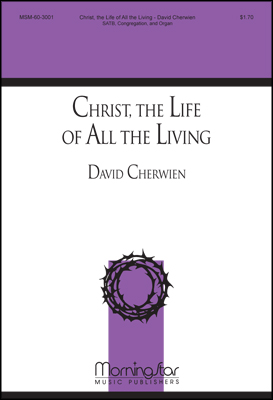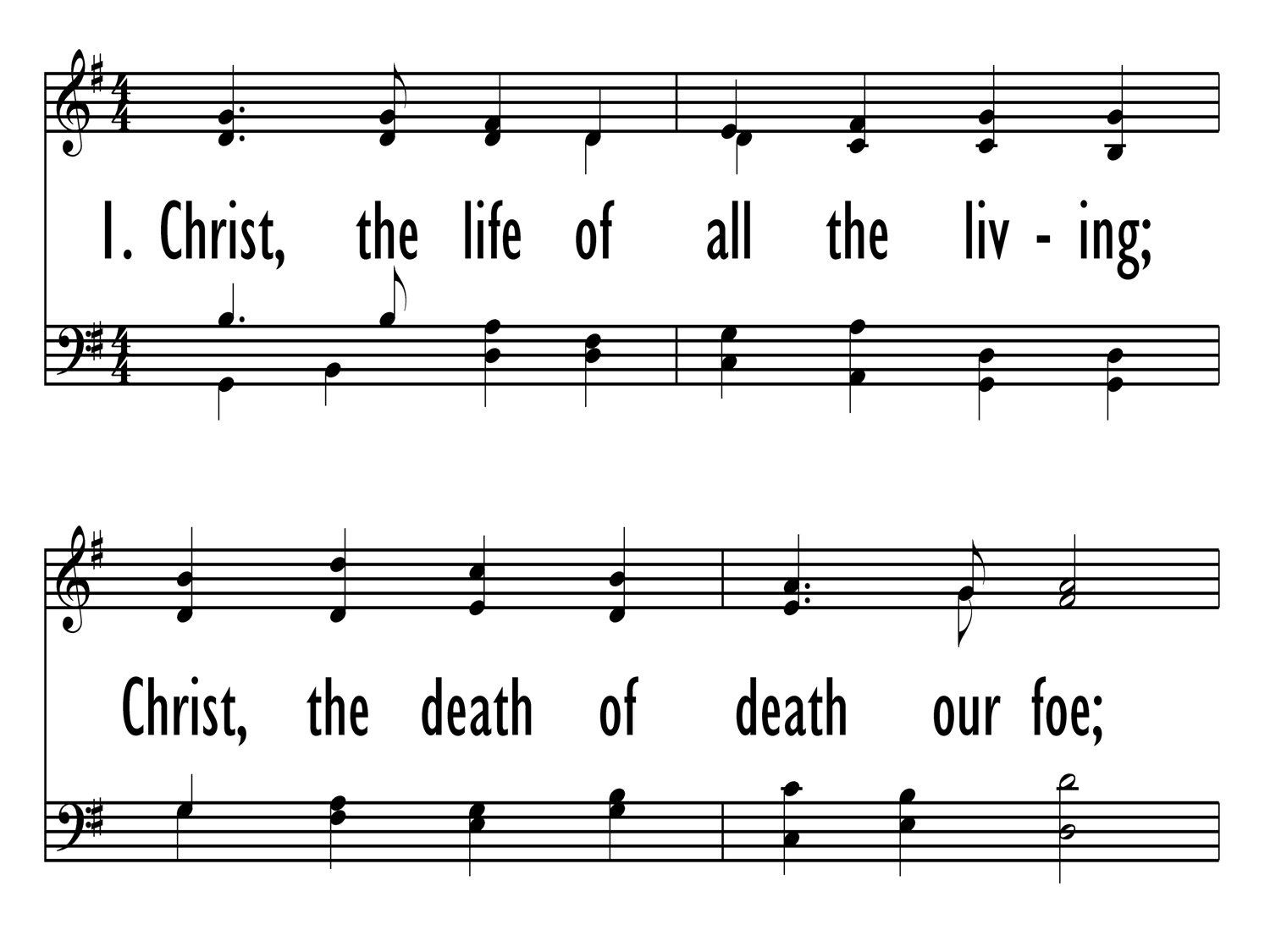- |
User Links
Christ the Life of All the Living

Christ the Life of all the living
Author: Ernst C. Homburg (1659); Translator: Catherine Winkworth (1851)Tune: [Jesu, meines Lebens Leben] (11756)
Published in 66 hymnals
Printable scores: PDF, MusicXMLPlayable presentation: Lyrics only, lyrics + musicAudio files: MIDI, Recording
Representative Text
1 Christ, the life of all the living,
Christ, the death of death, our foe;
who Thyself for me once giving
to the darkest depths of woe,
patiently didst yield Thy breath
but to save my soul from death;
praise and glory ever be,
blessed Jesus, unto Thee.
2 Thou, O Christ, hast taken on Thee
bitter strokes, a cruel rod;
pain and scorn were heaped upon Thee,
0 Thou sinless Son of God;
only thus for me to win,
rescue from the bonds of sin;
praise and glory ever be,
blessed Jesus, unto Thee.
3 Thou didst bear the smiting only
that it might not fall on me;
stoodest falsely charged and lonely
that I might be safe and free;
comfortless that I might know
comfort from Thy boundless woe;
praise and glory ever be,
blessed Jesus, unto Thee.
4 Then for all that wrought our pardon,
for the sorrows deep and sore,
for the anguish in the garden,
I will thank Thee evermore,
thank Thee with my latest breath
for Thy sad and cruel death,
for that last and bitter cry,
praise Thee evermore on high.
Source: Psalms and Hymns to the Living God #278
Author: Ernst C. Homburg
Ernst C. Homburg (b. Mihla, near Eisenach, Germany, 1605; d. Naumberg, Germany, 1681) wrote most of his hymns for his own devotions. He described this eight-stanza text as a "hymn of thanksgiving to his Redeemer and Savior for his bitter sufferings." In early life, Homburg was a writer of love and drinking songs. After a difficult time of family illness he experienced a religious conversion, and his poetry took a more serious turn. A lawyer by profession, he wrote hymns to express and strengthen his own faith rather than for public use. Some 150 of his hymn texts were published in his Geistliche Lieder. Bert Polman… Go to person page >Translator: Catherine Winkworth
 Catherine Winkworth (b. Holborn, London, England, 1827; d. Monnetier, Savoy, France, 1878) is well known for her English translations of German hymns; her translations were polished and yet remained close to the original. Educated initially by her mother, she lived with relatives in Dresden, Germany, in 1845, where she acquired her knowledge of German and interest in German hymnody. After residing near Manchester until 1862, she moved to Clifton, near Bristol. A pioneer in promoting women's rights, Winkworth put much of her energy into the encouragement of higher education for women. She translated a large number of German hymn texts from hymnals owned by a friend, Baron Bunsen. Though often altered, these translations continue to be used i… Go to person page >
Catherine Winkworth (b. Holborn, London, England, 1827; d. Monnetier, Savoy, France, 1878) is well known for her English translations of German hymns; her translations were polished and yet remained close to the original. Educated initially by her mother, she lived with relatives in Dresden, Germany, in 1845, where she acquired her knowledge of German and interest in German hymnody. After residing near Manchester until 1862, she moved to Clifton, near Bristol. A pioneer in promoting women's rights, Winkworth put much of her energy into the encouragement of higher education for women. She translated a large number of German hymn texts from hymnals owned by a friend, Baron Bunsen. Though often altered, these translations continue to be used i… Go to person page >Text Information
Related Texts
| First Line: | Christ the Life of all the living |
| Title: | Christ the Life of All the Living |
| German Title: | Jesu, meines Lebens Leben |
| Author: | Ernst C. Homburg (1659) |
| Translator: | Catherine Winkworth (1851) |
| Meter: | 8.7.8.7.8.8 with refrain |
| Language: | English |
| Refrain First Line: | Thousand, thousand thanks are due |
| Copyright: | Public Domain |
- Year A, Lent, Fifth Sunday
This is recommended for Year A, Lent, Fifth Sunday by 2 hymnal lectionary indexes including Lift Up Your Hearts: psalms, hymns, and spiritual songs #137. - Year C, Lent, Fifth Sunday
This is recommended for Year C, Lent, Fifth Sunday by 2 hymnal lectionary indexes including Lift Up Your Hearts: psalms, hymns, and spiritual songs #137.
Notes
Ernst C. Homburg (b. Mihla, near Eisenach, Germany, 1605; d. Naumberg, Germany, 1681) wrote this German chorale text (“Jesu, meines Lebens Leben”), which was published in Part One of his Geistliche Lieder (1658). Homburg, who wrote most of his hymns for his own devotions, described his eight-stanza text as a "hymn of thanksgiving to his Redeemer and Savior for his bitter sufferings." In early life Homburg was a writer of love and drinking songs. After a difficult time of family illness he experienced a religious conversion, and his poetry took a more serious turn. A lawyer by profession, he wrote hymns to express and strengthen his own faith rather than for public use. Some 150 of his hymn texts were published in his Geistliche Lieder.
The translation of selected stanzas is by Catherine Winkworth (PHH 194), who published them in her Chorale Book for England (1863).
The text is a meditation on the suffering and death of Christ, which brought eternal life to believers (st. 1), provided full atonement for our sin (st. 2), and mortified our "old nature" (st. 3). The tone of unending gratitude to God reflected in the refrain line–"thousand, thousand thanks are due"–runs throughout the entire text.
Liturgical Use:
Lent, especially Holy Week; any worship service with a thanksgiving focus.
--Psalter Hymnal Handbook
Tune
[Jesu, meines Lebens Leben] (11756)The composer of the tune is unknown; it was first published in Das grosse Cantional: oder Kirchen-Gesangbuch (Darmstadt, 1687) to the text "Alle Menschen mussen sterben" by J. G. Albinus; some Baroque organ works are associated with that text. The tune became associated with Homburg's text since the…
[Jesu, meines Lebens Leben] (Wessnitzer)
Timeline
Arrangements
Media
- Audio recording from Evangelical Lutheran Worship #339
- Audio recording from Lift Up Your Hearts: psalms, hymns, and spiritual songs #137
- Audio recording from Lift Up Your Hearts: psalms, hymns, and spiritual songs #137
- Audio recording from Lift Up Your Hearts: psalms, hymns, and spiritual songs #137
- MIDI file from Psalter Hymnal (Gray) #371
- MIDI file from Psalter Hymnal (Gray) #371


 My Starred Hymns
My Starred Hymns





